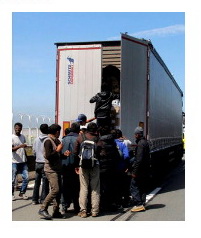Across
the continent of
Europe
, people are on the move. Their country of origin extends
from the North African coast into sub-Saharan
Africa
and across into the war- torn areas of the
Middle East
.
Many start out but do not make landfall in Europe,
losing their lives in ill-equipped boats, crammed to the gunnels by the
people-smugglers whose sole concern is to make money out of their helpless
plight.
Some are fortunate and get picked up at sea when
their own craft become water logged and sink. Others make landfall and provide a
huge logistical problem for the places where they beach. And so many others
drown in an unforgiving sea.
Once ashore their problems are far from over. We
have seen many pictures on the television news and in the press of confrontation
with police and armed forces, especially in the region of the Channel ports
where they attempt to gain access to the
UK
via large transport vehicles or the Eurostar train.

And we have become neutralised by the repeated
scenes of fellow human beings struggling to survive.
So what do we do, how to we solve this seemingly
endless tide of humanity so desperate for help that they are willing to risk
their very lives seeking it?
Until such time as we solve the basic reasons for
their exodus from their homeland, we will be faced with the struggle to care for
those that make it to our shores.
If ever the European Union
had a cause to be united, this is surely a clear instance calling for
co-operative action. As in so many other matters since then, Francis, early in
his occupancy of the See of Peter, led by example. In July 2013, he went to the
island of Lampedusa to celebrate mass at the dockside of this small
Mediterranean island off the southern toe of Italy that had become, for so many,
their European landfall after a perilous sea crossing.
He prayed for migrants, living
and dead, and denounced their traffickers.
These people are not so much flotsam that can be
cast on the sea with little concern. It is not a small matter of two or three
being lost overboard, but of countless hundreds who never make it, men, women
and their young children whose lives are lost in terrible circumstances.
The Synod of the Family is due to open on October 4th
in
Rome
. There will be much discussion, argument and attempted clarification on
issues relating to family life. Yet the issues go
beyond the nuclear family and the issues of if and when, how and why. Back in
the 80s the Spinners, a Merseyside folk group, recorded a song, The Family of
Man.
https://www.youtube.com/watch?v=IjsR7eqqHug
The
family of Man keeps growing
The family of Man keeps sowing
The seeds of a new life every day
I belong to a family, the biggest on the earth
Ten thousand every day are coming to birth
Our name isn't
Davis
, Hall,
Groves
, or Jones
It's a name every man should be proud he owns
It’s
the family….
I've
got a sister in Melbourne, a brother in Paris
The whole wide world is dad and mum to me
Wherever you go you'll find my kin
Whatever the creed or the colour of the skin
It’s
the family…
The
miner in the
Rhondda
, the coolie in
Peking
The men across the ocean who plough, reap and spin
They've got a life and others to share it
So let's bridge the oceans and declar
It’s
the family…
From
the North Pole ice to the snow at the other
There is not a man I wouldn't call brother
But there isn't much time, I've had my fill
Of the men of war who intend to kill
It’s
the family…
Some
people say the world's a horrible place
But it's just as good or bad as the human race
Dirt and misery or health and joy
Man can build or can destroy
Those
words are relevant to the crisis we now face.
We are not alone with our turbulence in
Europe
, for in other parts of our Earth, conflict, famine or
drought puts people and their belongings on the road, seeking a better future.
Where do we go from here, how can the Christian
people offer sustenance to those whose lives have been disrupted and now seek
shelter and safety with us?
The
Synod on the Family in October has a broad canvas to consider.
END
----
